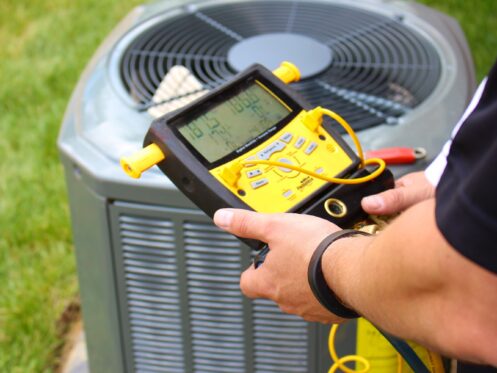When the weather starts warming up, the last thing you want is to discover your air conditioner isn’t working. A few strange noises or weak airflow might not seem like a big deal now, but they can become bigger problems when summer is in full swing.
Checking Your Air Filter
When your air conditioner starts to struggle, your air filter is the first place to look. This filter is frequently overlooked. However, it plays a big role in how well your AC system can cool your home. If your filter is full of particulate matter, air flowing through the system slows down. This puts extra strain on your system and makes it harder to keep rooms cool.
If your filter hasn’t been changed in a while, you might notice inconsistent temperatures in your residence. Your AC system might run longer than usual or turn off before achieving a comfortable temperature. A dirty filter can also lead to dust accumulating on surfaces. If you notice an increase in allergy symptoms or notice a musty smell coming from your vents, it might be time for a filter replacement.
Pull the filter out of its housing and hold it up to a light. If you can’t see light passing through it, swap it out with a new one. This is a simple task that helps get your system ready for summer heat waves. If you change the filter and still have problems, you may need professional AC maintenance or a repair job.
Listening for Unusual Noises During Startup
When your air conditioner turns on, it’s normal to hear a low humming sound or a whoosh of air. If you hear banging, rattling, buzzing, or anything that isn’t typical, pay close attention to what’s going on. These sounds can point to loose parts, a failing motor, or debris caught inside the unit. A buzzing sound could mean there’s an electrical issue. This isn’t something you want to ignore, as electrical problems can pose a safety risk.
Pay attention to any screeching sounds or large bangs when your AC unit starts. The fan or motor may be wearing out. Catching problems early can often help you avoid a full system failure during the hottest part of the season. Even if the AC still cools the house, strange noises usually mean something is out of balance or under stress. It’s better to have it checked before summer when demand goes up and small issues develop into expensive and involved ones.
Testing Airflow in Different Rooms
Sometimes, your AC seems to be working correctly if you’re standing near a vent. However, parts of your house may still feel warmer than they should. This can mean airflow isn’t consistent throughout the home. A dirty or damaged duct may be the cause, in addition to other AC problems.
Hold your hand near each vent while the system runs. You should feel a steady stream of cool air. If one room’s airflow feels weaker than others, something might be impeding the flow of cool air, like furniture, a closed register, or a buildup of particulate matter in the ductwork.
If you notice weak airflow throughout your whole house, there might be a blower motor problem. The fan that pushes air through your ducts might be malfunctioning or dealing with resistance inside the system. Check that your vents are open, the returns are clean, and the area around your indoor unit isn’t blocked by anything that could cut down airflow. If the problem doesn’t improve, it might be time for a closer inspection.
Checking Thermostat Settings and Location
If your AC keeps running but the temperature never feels comfortable, your thermostat may not be taking accurate readings. Start by checking that the thermostat is set to cool and not the fan setting. Next, check where the thermostat is located. If it’s near a sunny window or close to a kitchen, readings may reflect a house that is warmer than it really is. This situation can make your AC work harder and run longer than necessary.
If you’ve recently had a new thermostat installed or made the switch to a smart model, have a professional ensure it’s properly wired and programmed. Settings may need to be adjusted according to your preferred cooling schedule.
Clearing Debris From Your Outdoor Unit
Your outside AC condenser plays an important role in the cooling process. It pulls heat from inside your home and releases it outside. If this unit is clogged with leaves, branches, or dirt, it doesn’t experience a normal flow of air. This puts pressure on the system and cuts its efficiency. Ensure there’s a few feet of clearance on each side. Pull weeds, trim back bushes, and clear any buildup that might have settled in the coils.
If the fins look dirty or blocked, you can gently spray them with a hose to rinse away loose dirt. Clearing the area around your condenser is an easy way to help promote airflow in preparation for the summer. Normal airflow helps the system cool your home efficiently and puts less stress on your cooling equipment.
Watching for Short Cycling Before the Weather Gets Hot
When your air conditioner turns on and off quickly before completing a full cycle, it’s called short cycling. You might hear the unit kick on, blow air for a minute, then shut off and repeat the cycle again soon after. This is a common sign that something isn’t working correctly.
This is an issue that can happen if your AC system is incorrectly sized. This can also occur because of thermostat problems. A dirty coil, low refrigerant, or even a clogged filter can also trigger short cycles. Each time the unit starts, it uses more energy than when it runs steadily, which means your energy bills may increase even though your house isn’t achieving a cool temperature.
Spotting Signs of a Refrigerant Leak
Low refrigerant levels can make the air feel warmer, even when the unit runs longer than usual. You might also see frost forming on the coils or the refrigerant line near the outdoor unit. It’s a possibility that the indoor coil will freeze, and the system will cease cooling completely. If you shut it off and let it thaw, it might start working again. However, this doesn’t fix the reason it froze in the first place.
Refrigerant leaks can also damage your compressor if they’re ignored. If you hear hissing sounds or see ice where it doesn’t belong, don’t wait for the system to fail. It’s best to have an AC repair service expert check the pressure and fix the leak before your home starts to heat up this summer.
Fix Your AC Problems Early
Ahoy! Cooling & Heating in Tampa, FL can help you stay cool when it counts by performing a full AC inspection or repairs. We also offer heating, ductless and zoned AC systems, duct cleaning, UV lights, and air quality control services for optimal AC function. Contact Ahoy! Cooling & Heating today for an appointment.

